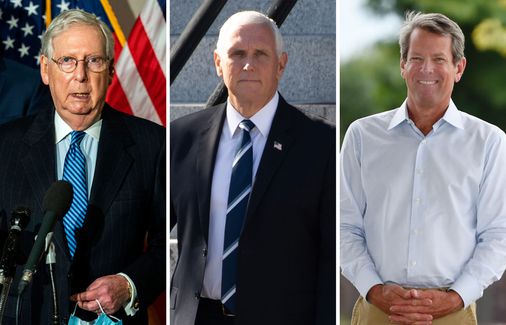The twists and turns as a new presidential administration take shape are always interesting to watch. It is no different with the incoming administration of Joe Biden, which seeks to balance a number of objectives at once: picking the most experienced and diverse group of leaders who can get confirmed by what is likely to be a Republican-controlled Senate — and, at the same time, not alienating the progressives who control the Democratic Party.
So far, so good.
But, strange though it may be, during this period of transition, the most three most interesting people in American politics right now having nothing to do with the Biden-Kamala Harris administration. In fact, they aren’t even Democrats.
In the closing weeks of 2020, three Republican leaders hold the cards about what the future looks like in our pandemic-ridden country and in the Trump-led Republican Party. We don’t know what these three men will do. But it’s getting to decision time.
Senate Majority Leader Mitch McConnell of Kentucky
McConnell is where American political rubber is meeting the road.
Last week, the idea of there being another round of COVID-stimulus money was essentially dead. The only reason there are significant and seemingly very real discussions on some type of deal this week is that McConnell got motivated and he claims he has convinced President Trump to do something as well.
McConnell is facing a lot of political pressure and has a deadline to deal with: The government could shut down at the end of next week. And dealing with a Republican president is easier than dealing with a Democratic one next month.
Then there is also the not-so-insignificant thing that that bipartisan group of nine Senators came up with their own COVID relief framework. McConnell may want to get ahead of that group being a permanent thing and basically controlling the slim majority Senate for the next two years. If that group got a big win like moving a stalled COVID relief package into law, then it would significantly challenge McConnell’s power.
You know what else would challenge McConnell’s power? Losing the majority if Democrats win both US Senate runoff elections in Georgia next month. It may be one reason why McConnell is purposefully not taking a stand on whether Trump’s claims of rampant voter fraud are real (there is no evidence that they are, and lots of evidence that they are not). McConnell needs the Republican base engaged in Georgia for the runoff elections, but at the same time, he doesn’t want his party to follow the advice of some of the president’s backers to not vote in the so-called rigged elections.
Vice President Mike Pence
Pence has been extremely quiet and not all that visible since the election. Like McConnell, he, too, has every incentive for the nation to move on from Trump so they can craft the Republican Party in a different way. At the same time, Trump owns the Republican Party at the moment and if they move too quickly, their future power might be diminished.
There is probably no one more harmed by Trump floating the idea of running in 2024 than Pence, who by all indications would like to run for president himself.
But in the short term, he might have a weird and career-defining gavel strike ahead of him. If Alabama Representative Mo Brooks, a Republican, is able to find a partner in the Senate to officially challenge the results of the election on Capitol Hill (a process they will lose), then it will be on Mike Pence, presiding as Senate presidency, to rule that the motion failed.
Pence knows Trump’s Twitter feed could remember that for a while, so it isn’t exactly clear what he will do or how he could get out of that moment. At the same time, we are talking about Pence, who actually flew on a taxpayer-funded plane to an Indianapolis Colts NFL game to walk out after the National Anthem in a photo-op because he was mad football players took a knee in support of the Black Lives Matter movement.
Governor Brian Kemp of Georgia
All eyes are on Georgia with the Senate runoff contests looming, but all heads should be scratched over the totally weird situation Georgia Governor Brian Kemp is in right now. Kemp ran for Secretary of State on the issue of voter fraud. He became a national figure because he was so aggressive in what Democrats called voter suppression. In fact, he kicked so many voters off the rolls that when he became governor in 2018, his opponent, Stacey Abrams questions whether it was even a legitimate election.
But suddenly he is a prime target of Trump this week, who has accused Kemp of being too soft on voter fraud. Kemp has said (correctly) that Biden narrowly won Georgia after the latest recount verified that he did. Trump attacked Kemp on Fox News on Sunday and then on Twitter the next day.
Will Kemp hold firm to the confirmed results or will he find a way to please Trump?
Kemp is now both toxic to the Republican base and potentially a key player in the US Senate remaining in Republican hands. Kemp could try to push back on Trump’s claims, aiming to help Republican Senate candidates in the suburbs, where voters seem tired of the president’s antics, but that would also risk Kemp facing a Republican primary in two years.
James Pindell can be reached at james.pindell@globe.com. Follow him on Twitter @jamespindell.































